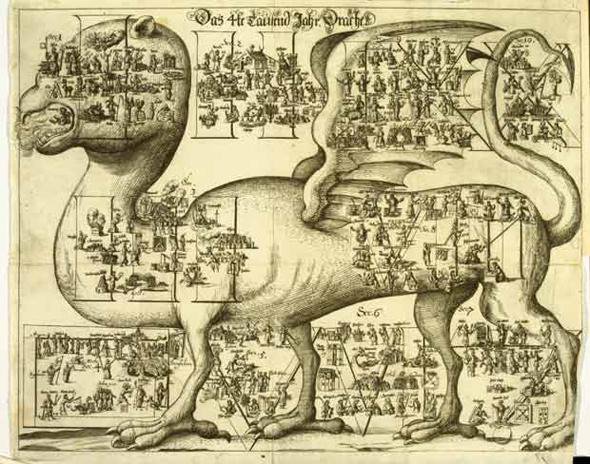Antonio Gagliano
dal 2/7/2014 al 6/9/2014
Segnalato da
2/7/2014
Antonio Gagliano
Fundacio Joan Miro', Barcelona
Buno. The exhibition is a review of chronological time and its ways of representation, developed from the work of Johannes Buno, a pioneer German draftsman that illustrated time through images.

Curated by Oriol Fontdevila
Antonio Gagliano presents an exhibition that develops from the work of
Johannes Buno, a pioneer German draftsman that illustrated time through
images.
Buno, the exhibition, a review of chronological time and its ways of
representation, can be seem from July 3rd to September 7th at Fundació Joan
Miró’s Espai 13.
At the end of the Seventeenth Century, Johannes Buno became one of the last
instigators of the ars memoriae with the invention of a genuine method to help
us remember things with ease. He tried to draw the history of human culture,
establishing relations between great blocks of time and images. These
mnemonic images were diagrams showing a series of historical facts distributed
in a strategic manner that resulted in allegorical figures of animals.
Buno develops from the understanding that Montjuïc can also be one of those
monstrous animals. During the Twentieth Century, the mountain became a
construction, not only historical, but also historiographical, that discovered its
point of origin in the infrastructures that were built for the 1929 International
Exhibition. At the basement of the show at the Palau Nacional, a diorama of the
Altamira cave provided Spain with its mythical past. Interestingly enough, this
element has also become the cornerstone of the “center of intelligence
accumulation”, which, in Gagliano’s words, is what the entire mountain has
been transformed over the years.
Antonio Gagliano creates exchanges between facts —understood as historical
events— and myths —as the stories that allow their understanding. This subject
of the Altamira cave becomes an example of this double vision of history that
Gagliano suggests: caught between its own mythical condition in a universal
visual culture and its structural status for the understanding of a historical
moment.
Gagliano focuses his research on all that memory that has been stored inside
the institutions of Montjuïc, spreading it out through new connections and
historiographical exchanges. The artist completes his work on time
representation by using three regular structures that are part of the traditional
methods of conveying knowledge: a publication, drawings or representations,
and the projection of images.
The first object in the exhibition is a free-of-charge publication that describes the
concept of the show, which the viewer can take home. The review of the
Altamira caves is included in this first piece. The publication serves as
foundation for three projections that take place in different parts of the gallery,
which, accordingly, present several historical cases of time representation and
mnemonic systems that Gagliano interconnects.
The third part of the exhibition, described by the artist as galaxia transferida a
línia artificial [galaxy transferred to an artificial line], is a group of forty pieces
hanging from the walls showing historical documents redrawn by Gagliano on
aluminum. Some of these documents, shown in pairs, cannot be made public
and are, therefore, released in this drawing and exhibiting manner.
This exhibition ends the series Arqueologia preventiva [preventive archaeology],
curated by Oriol Fontdevila and included in the activities commemorating the
1714 Tricentenari. During the 2013–2014 program, four artistic proposals by
Oriol Vilanova, Lúa Coderch, Lola Lasurt and Antonio Gagliano have been
presented, interpreting the concept of collective memory and examining
different ways of explaining history in the present. As surveyors do prior to an
excavation, these series hope to follow the heritage and the elements that,
having reached the present, put us in relationship with our past.
Activities around Buno
Espai 14–15 is a project by LaFundició that links the proposals for Arqueologia
preventiva with several sociocultural areas and takes, as a point of departure,
the opening of a space in an apartment block of the Bellvitge neighborhood.
Taller no lineal [nonlinear workshop]
Espai 14–15
By Antonio Gagliano
Limited places available
Free-of-charge registration: hola@lafundicio.net
Wednesday, September 10th, from 5:00pm to 8:00pm
Friday, September 12th, from 5:00pm to 8:00pm
Saturday, September 13th, from 5:00pm to 8:00pm
Workshop and open and mobile laboratory. A caravan will be used to move a
drawing workshop around the Bellvitge during the major festivities held in the
neighborhood with the aim to launch different processes of analysis around the
history of the area and interact with its surroundings and communities. The idea
is to try strategies of representation that capture the narratives and discourses
that have been built on this neighborhood over the years.
Taller no lineal is included in the celebrations for the 50th anniversary of the
creation of the neighborhood, which will take place in 2015 and is sponsored by
Bellvitge50. The workshop will offer the possibility to share, review and rethink
many subjects dealing with the area, which have been developed by the
different local associacions, as, for instance, the Institut Bellvitge, the
Associació de Veïns i Veïnes de Bellvitge, the Centre Esclat and the Centre
d’Estudis de l’Hospitalet, among others. The caravan that will structure all this
comes from the LaFundició’s Open-roulotte project and has been kindly made
available by the Patronat de Cultura de Ripollet.
Closing party for the workshop
Saturday, September 20th at 8:00pm
As part of the major festivities of the Bellvitge neighborhood
Plaça de la Cultura, Bellvitge
Cameroonian cuisine tasting by the Associació Cultural Balafon
Image: Time Mapping by Johannes Buno, 1617–1697
For more information
Premsa Fundació Joan Miró – press@fundaciomiro-bcn.org – +34 93 443 90 70
Elena Febrero: 646 190 423 / Helena Nogué: 630 634 905
Opening: Thurday, July 3rd at 8:00pm
Fundació Joan Miró - Espai 13
Parc de Montjuïc - Barcelona
Tuesday to Saturday from 10:00am to 7:00pm
Thursday from 10:00am to 9:30pm
Sunday and holidays from 10:00am to 2:30pm
Monday (except holidays) close
Entry price for Espai 13: 2,5 €



